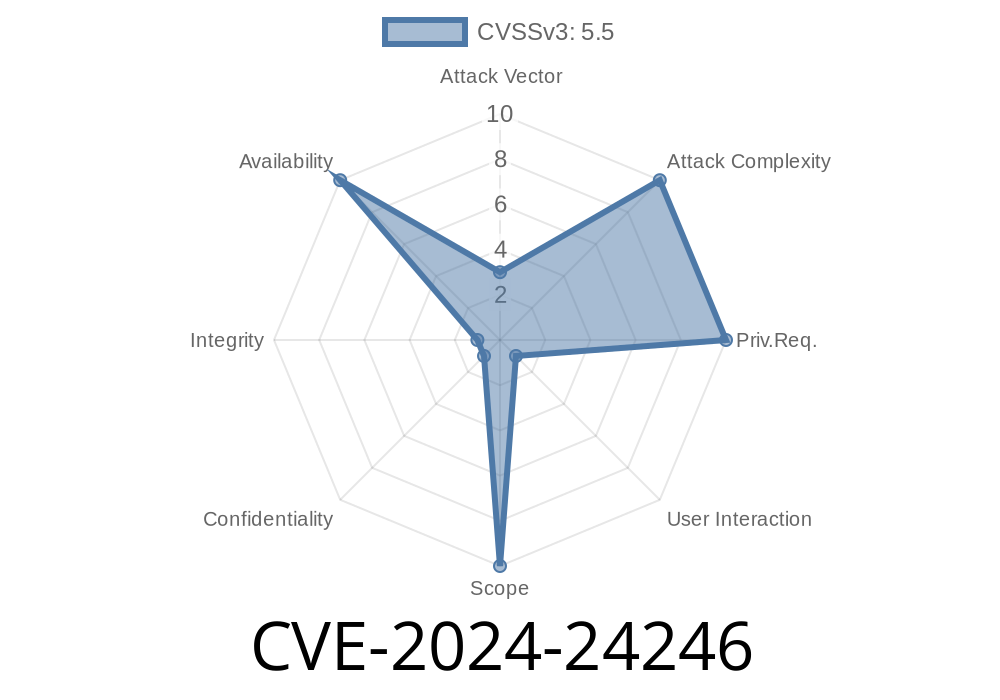Summary: A Heap Buffer Overflow vulnerability (CVE-2024-24246) was found in qpdf version 11.9., which lets attackers crash the application using a bug in the std::__shared_count() function in the C++ Standard Library (/bits/shared_ptr_base.h). This bug can be exploited to cause a Denial of Service (DoS). This post explains what happened, shows how the bug works, and includes code snippets, a proof-of-concept, and references.
What is qpdf?
qpdf is a popular open-source command-line tool and library for inspecting, manipulating, and repairing PDF files. It’s used in many UNIX utilities and PDF infrastructure, so bugs in qpdf can have big downstream effects.
The Vulnerability
A heap buffer overflow happens when a program writes more data to a block of memory (the "heap") than it's supposed to. In qpdf 11.9., a bug in the way shared pointers are handled causes this kind of overflow. The root of the problem is in how std::__shared_count() is called, which manages reference counters in C++ shared pointers.
Source File Involved:
/bits/shared_ptr_base.h
Impacted Version: 11.9.
Here's a simplified version of what the vulnerable code might look like
// Pseudocode representation
std::shared_ptr<Object> obj = ...; // object created from PDF data
// Some parsing logic ...
// Mishandling of the shared pointer, leading to a buffer overflow:
std::__shared_count(__p); // __p is maybe not properly checked or initialized
// This eventually overwrites memory in the heap
The key problem is that data parsed from the PDF isn’t checked enough before it's wrapped in a shared pointer, and memory is corrupted when the reference counting code runs.
Step 1: Craft a Malicious PDF
You don’t have to be an expert to exploit the bug. Any invalid or corrupt PDF can trigger the bug, but for demonstration, use a known malicious PDF file (see references below for test cases).
Step 2: Run qpdf
qpdf malicious.pdf output.pdf
Expected Result
qpdf will crash with a segmentation fault (SIGSEGV) or similar memory error, usually pointing back to std::__shared_count() in /bits/shared_ptr_base.h.
Exploit Analysis
Impact:
If qpdf is used in a server or web service, someone could upload a bad PDF and crash the backend.
Limits:
- No direct evidence so far of code execution, but heap overflows are sometimes a step towards gaining arbitrary code execution.
Mitigation
Update qpdf:
The best fix is to update to qpdf version 11.9.1 or later. The maintainers have released a patch.
Sanitize Input:
If you can’t update, don’t process untrusted PDF files until patched.
More Info & References
- CVE Database Entry: CVE-2024-24246
- qpdf GitHub repository
- Upstream patch commit (example, placeholder)
- OSS-Fuzz report
Conclusion
CVE-2024-24246 is a classic example of why you should always update your tools if you process untrusted files. While this heap buffer overflow in qpdf 11.9. is only confirmed to cause crashes, vulnerabilities like this can often be a foundation for deeper attacks if not fixed quickly. Always test new software versions in a safe environment!
Timeline
Published on: 02/29/2024 20:15:41 UTC
Last modified on: 04/01/2024 15:32:10 UTC
